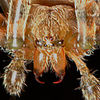Different Bokeh........
Dec 7, 2011 16:50:35 #
Nikonian72 wrote:
Blah, blah, blah! br br I have been selecting m... (show quote)
Actually boke, originally and literally translates to blurry , hazy in the Japanese language. Japanese etymology of boke was a reference to blurry, hazy then followed to also describe the mentally demented, senilie, etc. . It seems recent references in photography use the word as both noun and adjective, probably also as pronoun and verb. Knew you would want the complete story.
Dec 7, 2011 17:30:22 #
I try not to use in in class, but it is a short term for SA. It's sorta like the IT guys using "the Cloud". Overused. I guess it could be called a henweigh...thats simple enough.
Dec 7, 2011 18:41:54 #
Nikonian72 wrote:
quote=Sam55 I have a question that may or may not... (show quote)
OK, thanks for that reply, I now realize that my older Canon lens were that, manual lens, fixed focal and not zooms like the newer lens that came with my latest camera, but I had looked at several other lens and noticed that the lines were gone, but now realize that they too were the zooms, with auto focus.
Dec 7, 2011 18:53:01 #
That out-of-focus area behind the subject of my photo can certainly enhance my photo. It is noticeable, and very real, and was given a name . . . bokeh. It's really that simple.
Dec 7, 2011 19:05:47 #
Roger Hicks wrote:
Exactly. And if the discarded peanut shell is more... (show quote)
I do not deny the existence; I deny the importance. A peanut shell, like a rose, is still a peanut shell, no matter what name you give it. I suspect that you consider me "Old School" which is just fine with me. In my experience, it is the photographers-come-lately that consider out-of-focus background as important.
Dec 7, 2011 19:57:59 #
Dec 7, 2011 21:06:13 #
I guess what it comes down too is this: Which sentence sounds better No.1 "Hey Harry, I think I got a little too much bokeh in my background" Or No.2 "Hey Harry, I think I my background is a little blurry" I'd go with No.2
Dec 8, 2011 10:16:12 #
This topic is like the game of making a statement, and passing on to the next person, who repeats the words and so it goes around a circle of several people. By the time its heard at the end of the circle you wonder what was said the first time out. Why I don't like putting my feet in this water topic...to much on opinions. Larry
Dec 8, 2011 10:57:04 #
Well, no one is going to know what I'm talking about. I pronounce it "boo ka".
I see, I'm saying it wrong.
It hurts a little, to admit that.
I don't know if I can change.....
Pat
I see, I'm saying it wrong.
It hurts a little, to admit that.
I don't know if I can change.....
Pat
Dec 8, 2011 11:46:13 #
Roger Hicks
Loc: Aquitaine
Nikonian72 wrote:
I do not deny the existence; I deny the importance. A peanut shell, like a rose, is still a peanut shell, no matter what name you give it. I suspect that you consider me "Old School" which is just fine with me. In my experience, it is the photographers-come-lately that consider out-of-focus background as important.
Well, I think that we don't disagree much on the question of importance, which is, for me and for many others, very low. It is not however completely negligible. Some backgrounds, with some lenses at some apertures, look really nasty when they are out of focus. This, to me, qualifies as 'bad bokeh' if it would not have been obtrusive with another lens. I don't really believe in 'good bokeh', because, as you have repeatedly said (and I agree with you completely) an out-of-focus background is supposed to be unobtrusive.
But would you deny that some backgrounds look more obtrusive than others? And that part of this is due to the lens? This is all that bokeh means: the differences in the quality of the out-of-focus image.
I'm pretty old-school myself, but I remember people remarking on the quality of the out of focus image long before the word 'bokeh' was adopted. To quote myself yet again, from http://www.rogerandfrances.com/subscription/bokeh.html
"Although the word is hopelessly over-used by some people, it is far from useless, as it replaces the somewhat cumbersome phrase that was in use before: the quality of the out-of-focus image."
and
"Admittedly, some photographers seem to be a lot more sensitive to bokeh than others. Some don't notice at all; to some, it is the be-all and end-all; and in between, the vast majority of photographers are more or less aware of it. They may notice that one picture looks inexplicably better than they would expect, or inexplicably not as good. We have to admit that we are not outstandingly sensitive to bokeh, so that it has to be exceptionally nasty before we notice: we may therefore remark on unpleasant bokeh but we do not recall ever looking at a picture and saying, "What magnificent bokeh!" In other words, in our view, and in the view of many other photographers, that bokeh is best which is least obtrusive."
and
"The point about differential focus is that for the most part, it's the differential focus that creates the impact, and not the out-of-focus area behind the subject. Few people, apart from bokeh-obsessed photographers, will pay much attention to the actual detail of the out-of-focus area; and often, even if it is drawn to their attention, they will see nothing much to praise or to damn in the way things are rendered. This is not to say that bokeh is meaningless: merely that it is possible greatly to overrate its importance."
Cheers,
R.
Dec 8, 2011 13:42:04 #
Jay Pat wrote:
Well, no one is going to know what I'm talking about. I pronounce it "boo ka".
I see, I'm saying it wrong.
It hurts a little, to admit that.
I don't know if I can change.....
Pat
I see, I'm saying it wrong.
It hurts a little, to admit that.
I don't know if I can change.....
Pat
"boo ka" looks and sounds more like bokeh than boke does...lol
"blurry background" without quantification, seems to be a good universal well understood phrase.... use of "blurry background" will not get one the WTF look.
Dec 8, 2011 13:43:06 #
cjkorb wrote:
I guess what it comes down too is this: Which sentence sounds better No.1 "Hey Harry, I think I got a little too much bokeh in my background" Or No.2 "Hey Harry, I think I my background is a little blurry" I'd go with No.2
ditto
Dec 8, 2011 14:57:39 #
Roger Hicks
Loc: Aquitaine
Except that "too much bokeh" is a completely meaningless statement. Bokeh is qualitative (i.e. "what does it look like?" ) not quantitative (i.e. "how much of it is there?" )
Once you have established the quality of the bokeh (smooth, swirly, wiry, whatever -- none of the descriptive phrases is very satisfactory) you can start talking about whether it's too smooth, too swirly, too wiry, or whatever. As noted in the piece I keep quoting, I like the late Geoffrey Crawley's definition:'good bokeh (preservation of subject shape in out of focus planes)'
After all, there are only two possibilities when it comes to bokeh. One is that something a LOT of people (including me) say they can see is non-existent, and they're all liars. The other, as Douglass says, is that you acknowledge its existence, but to dispute its importance. The latter is perfectly valid, and as I've tried to make clear throughout this thread, I attach very little importance to it myself. But to say that it is NEVER important is really only to say that you can't see it, which is back to option one, namely, calling those who can see it liars.
Cheers,
R.
Once you have established the quality of the bokeh (smooth, swirly, wiry, whatever -- none of the descriptive phrases is very satisfactory) you can start talking about whether it's too smooth, too swirly, too wiry, or whatever. As noted in the piece I keep quoting, I like the late Geoffrey Crawley's definition:'good bokeh (preservation of subject shape in out of focus planes)'
After all, there are only two possibilities when it comes to bokeh. One is that something a LOT of people (including me) say they can see is non-existent, and they're all liars. The other, as Douglass says, is that you acknowledge its existence, but to dispute its importance. The latter is perfectly valid, and as I've tried to make clear throughout this thread, I attach very little importance to it myself. But to say that it is NEVER important is really only to say that you can't see it, which is back to option one, namely, calling those who can see it liars.
Cheers,
R.
Dec 8, 2011 15:10:24 #
Roger Hicks wrote:
Except that "too much bokeh" is a comple... (show quote)
The devil is in me today; so I am trying to decide; "bokeh is qualitative....., not qualitative..."
I give up! Which is it?
Dec 8, 2011 15:20:31 #
Roger Hicks
Loc: Aquitaine
pdwoodswood wrote:
The devil is in me today; so I am trying to decide; "bokeh is qualitative....., not qualitative..."
I give up! Which is it?
I give up! Which is it?
Good point, but as I defined what I meant to say in brackets, it's not hard to work out that qualitative refers to 'what is it like?' and quantitative to 'how much of it is there?'
Yes, a typing mistake/brain fade, which is divine retribution for my most recent post on black painted versus chrome cameras.
Cheers,
R.
If you want to reply, then register here. Registration is free and your account is created instantly, so you can post right away.





